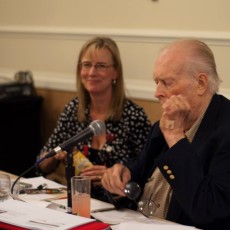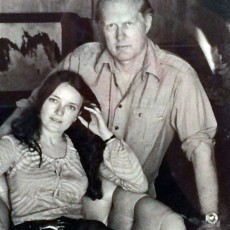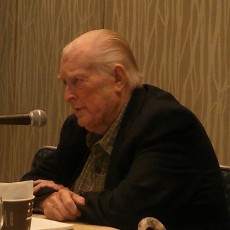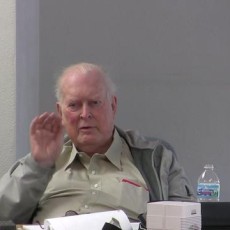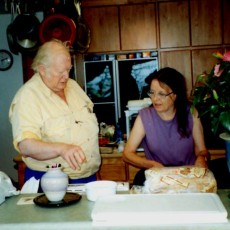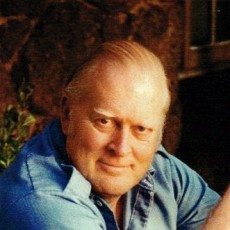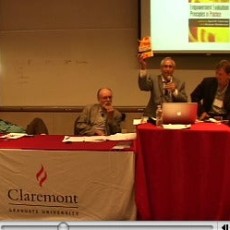Michael Scriven
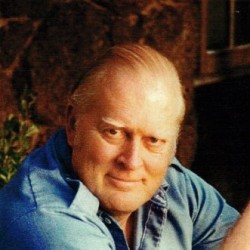
MICHAEL SCRIVEN is a Distinguished Professor at the Division of Behavioral and Organizational Sciences at Claremont Graduate University and Co-Director of the Claremont Evaluation Center. Developing keen interests in mathematics and philosophy at an early age, Scriven earned undergraduate and graduate degrees from Melbourne University, Australia, and later a doctorate from Oxford University, while also demonstrating his abilities as an athlete in rowing, sports car racing, and Frisbee. World-renowned for his distinguished scholarly contributions, Scriven has dedicated more than fifty years to interdisciplinary research. He has served as a faculty member or chair teaching mathematics, philosophy, psychology, the history and philosophy of science, law, evaluation, and education at universities in the United States and around the world. As a past president of the American Educational Research Association (AERA) and American Evaluation Association (AEA), he has received numerous awards and honors including the AEA Lazerfeld Prize (1986) for outstanding research contributions to the field of education and the Coalition for Research and Evaluation on Teacher Education (CREATE) Jason Millan Award (2001) for scholarly contributions to educational theory and practice. Scriven, also honored as a Fellow for the Center for Advanced Study in the Behavioral Sciences at Stanford University, an Alfred North Whitehead Fellow at Harvard University, and a Fellow at the Australian Academy of the Social Sciences, has served on the editorial and advisory boards of more than 40 scholarly journals and authored more than 450 publications in the fields of his appointments and in computer science, informal logic, cosmology, international philanthropy, and technology studies.
To view photographs from Michael Scriven’s personal collection, visit his Photo Gallery.
Visit the video below to watch a short overview of the interview with Michael Scriven. Otherwise, see all four of the full interviews with Michael Scriven below.
Video Interviews with Michael Scriven:
Emigrating to Australia in the 1940s with his mother and brother to escape the dangers of wartime England, Dr. Michael Scriven recalls his early years of schooling and hopes of becoming a fighter pilot like his father. Having taken high school courses in navigation, he earned undergraduate and graduate degrees in mathematics before discovering he also had an interest in philosophy. Scriven explains that he “hit his stride” as a doctoral student at the University of Oxford, noting that he was “fascinated by the deeper problems of philosophy upon which everything we know is built.” Having met his wife while teaching at Indiana University, Scriven describes their shared interests that prompted him to begin evaluating teaching as a serious process. In this clip, enjoy stories from Dr. Scriven about his athletic accomplishments on the university crew team, his position on the Frisbee Hall of Fame, and also learn more about his early career experiences as a mathematician and philosopher.
Recalling the surge in federal education spending in the late 1950s after the launch of the Russian satellite Sputnik, Dr. Michael Scriven notes the increased national interest in mathematics and science, in some regards at the expense of social studies and other subject areas. Having focused on teaching critical thinking as an extension of logic and ethics, Scriven notes that there was “nothing good” in the existing research about how to evaluate teaching; this was the impetus for his work developing evaluation as a discipline. He discusses the historically contested role of value claims in social science research and calls attention to the importance of addressing ethics in evaluation “as the toughest nut of all teaching problems to crack,” arguing that “you can determine right and wrong in math but not in ethics.” Watch this clip to engage with Dr. Scriven in a discussion about truth and learn more about the importance of applied logic and ethics in dealing with complex social issues.
Describing a half-century old conundrum facing social scientists regarding math application in the real world, Dr. Michael Scriven critiques the use of statistical significance as a representation of true significance in evaluation and other social science research. He explains that “good science in evaluation is knowing the limitations” and describes the need to examine the application of evaluation to other disciplines as the next stage. Reflecting on his evolving understanding of evaluation over the years, Scriven notes that he would have conceptualized evaluation in his early career as a comparison to the standards, whereas now he would evaluate how the standards were developed in the first place. In this clip, learn more from Dr. Scriven about the methodological skills every good evaluator needs and why evaluation should play an interdisciplinary role in future research.
In addition to “cracking the ethics problem,” Dr. Michael Scriven describes his interest in addressing other social issues through his research, including the need to improve designs for low-cost housing as a means of building homeownership. Having dedicated his career to scholarly research related to fundamental philosophical problems, most recently ethics, Scriven cites the pressing need to teach critical thinking and ethics as part of the curriculum in every school. He also shares advice for graduate students, encouraging them to resist pressure to specialize in one area of research. Rather, he suggests that emerging scholars who hope to make a difference should find their passion and “do what they can” to impact that area. Watch this clip to learn more from Dr. Scriven about the teachers and philosophers who influenced him as a student, and scholar, as well as opportunities to future research in evaluation.
Amrein-Beardsley, A. (2014, March 14). Inside the Academy video interviews with Dr. Michael Scriven [Video files]. Retrieved from /inside-the-academy/michael-scriven

